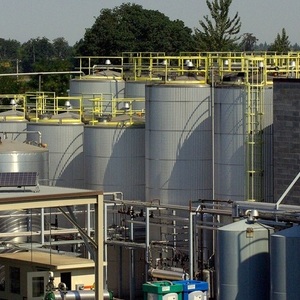SeQuential finalizes expansion, increases biodiesel production

Photo: SeQuential
November 5, 2019
BY Ron Kotrba
Crimson Renewable Energy-owned SeQuential, the Oregon-based biodiesel producer in operation since 2005, has completed an expansion at its Salem plant increasing production capacity by 30 percent. The current run-rate of the plant is more than 1 million gallons a month. Tyson Keever, chief operating officer for SeQuential, confirmed with Biodiesel Magazine that the nameplate capacity of the plant is 17 MMgy.
SeQuential has increased production every year since it began operating from its current facility in 2008. Upgrades made during the recently completed expansion also included additional storage and improved fuel blending and loading systems.
“We’re thrilled to continue growing our production capabilities here in Oregon,” Keever said. “Local demand for low carbon fuel has risen steadily over the past several years, thanks in part to the state’s commitment to carbon reduction. We expect that trend to continue, and we wanted to be sure we’re prepared to meet it.”
In addition to its plant improvements, SeQuential recently expanded its cooking oil collection and recycling service territory to include the Los Angeles and Orange County areas of Southern California. The company now collects cooking oil from nearly 20,000 customers across Oregon, Washington and California. Cooking oil collected in the Pacific Northwest is used to make biodiesel at the SeQuential facility in Salem, while cooking oil collected in California feeds the Crimson Renewable Energy biodiesel plant in Bakersfield, California. SeQuential was acquired by Crimson Renewable Energy in 2018. Together they form the largest vertically integrated, ultra-low carbon biodiesel producer on the West Coast.
Advertisement
Advertisement
“SeQuential is committed to producing the lowest carbon fuel we can,” said Harry Simpson, CEO Crimson Renewable Energy. “A key part of that strategy is making sure we have good access to high quality, low carbon raw material. Expanding our service territory into southern California is a natural progression of SeQuential’s used collection service and fits very well logistically with our Bakersfield biodiesel production facility.”
SeQuential’s biodiesel earned a carbon intensity rating of 14.85 under Oregon’s Clean Fuels Program, making it the lowest carbon liquid fuel available in the state.
Advertisement
Advertisement
Related Stories
U.S. fuel ethanol capacity fell slightly in April, while biodiesel and renewable diesel capacity held steady, according to data released by the U.S. EIA on June 30. Feedstock consumption was down when compared to the previous month.
The U.S. EPA on July 8 hosted virtual public hearing to gather input on the agency’s recently released proposed rule to set 2026 and 2027 RFS RVOs. Members of the biofuel industry were among those to offer testimony during the event.
The USDA’s Risk Management Agency is implementing multiple changes to the Camelina pilot insurance program for the 2026 and succeeding crop years. The changes will expand coverage options and provide greater flexibility for producers.
The USDA’s National Agricultural Statistics Service on June 30 released its annual Acreage report, estimating that 83.4 million acres of soybeans have been planted in the U.S. this year, down 4% when compared to 2024.
SAF Magazine and the Commercial Aviation Alternative Fuels Initiative announced the preliminary agenda for the North American SAF Conference and Expo, being held Sept. 22-24 at the Minneapolis Convention Center in Minneapolis, Minnesota.
Upcoming Events










